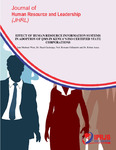Effects of Human Resource Information Systems in Adoption of QMS in Kenya 's ISO Certified State COrporations

View/
Date
2017Author
Weru, Jane Muthoni
Gachunga, Hazel
Odhiambo, Romano
Arasa, Robert
Metadata
Show full item recordAbstract
Purpose: The purpose of this study was to determine the influence of human resource information systems in adoption of QMS in Kenya ISO certified state corporations
Methodology: The proposed research consisted of a descriptive survey. The population comprised of fifty nine state corporations that were ISO certified on 9001:2008 series by the Kenya Bureau of Statistics. The study applied a stratified random sampling technique to select a sample size of twenty one state corporations. Purposive sampling technique was further applied to select four respondents in each of the twenty one selected state corporations. Questionnaires were used as the main data collection instruments and a pilot study was undertaken to pretest the questionnaires for validity and reliability. The gathered data was analyzed by use of Statistical Package for Social Scientists (SPSS) version 20. The analysis involved factor analysis; descriptive statistics where the means Standard Deviations and variances were established for all the factors tested in the questionnaires; Correlation analysis was done between the independent sub variables and the dependent variable; Linear regression analysis was also done; and t-test was used for the test of significance of individual coefficients. R-squared was used for the explanatory power of the model. The analysis was presented using tables and charts. The interpretations of data were also given as per the research objectives of the studies.
Results: Inferential statistics indicated that HRIS is very important in ensuring adoption of quality management systems in organizations.
Unique Contribution to Theory, Practice and Policy: Companies ought to examine their human resource information systems and for effectiveness before adopting the quality management systems
